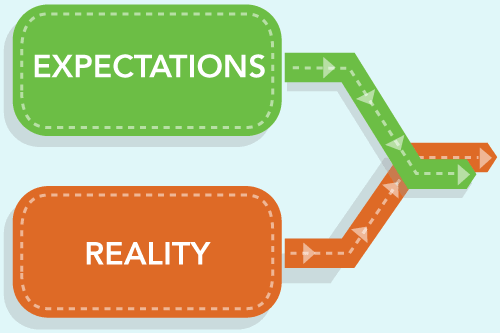When I was in eighth grade I had a “Wellness” class given by a classmate’s mother who had been a child actor and model. The boys were separated out and taken to (presumably) a similar class given by a male equivalent. (I have to wonder now, where exactly did they go? Who was the male equivalent? At the time, I never thought to ask.) All the eighth grade girls sat in a circle on the ground in front of this woman who stood before us in all her coiffed, fine featured, perfumed glory, wearing an oh-so-chic, red pants suit (this was the early ’70’s) and looking like she had just walked off a shoot for the cover of a fashion magazine. (Which, in fact, she had.)
I felt completely inadequate in comparison and all the more so as I sat listening to her glowing accounts of what she did for exercise, the wholesome meals she ate and her disciplined daily use of various emollients. I remember falling into despair as I listened to her, not only because I didn’t know what emollients were, or couldn’t imagine a life that did not include glazed jelly doughnuts, but because everything about her was foreign to me, forget that hers was not a life I had ever thought about having, let alone wanting. But as I sat there I was aware that I should want to be just like her. She represented all that was beautiful and unobtainable and I, in direct contrast, represented all that was wanting. I’ve never forgotten her.
When I gave birth to each of my children, the one thing I wanted more than anything else was to make sure they never felt ashamed of themselves. I wanted to make sure they felt supported, loved and valued for who they were, exactly as they were. I wanted to be sure I cheered them on, to model for them kindness, generosity, compassion and good work ethics. I swore to myself I would do my best to respect them and to listen to them. And then we were given Emma’s diagnosis and suddenly those goals took a back seat to the goal of her being “mainstreamed” and “indistinguishable from her peers.” Those two goals rammed up against my desire for her to feel self-love, self-acceptance, self-worth. For a couple of years I lost my way. In my desperation I allowed others to dictate what I should do and what I should want for my daughter. I forgot that my early goals for her were more important than anything else.
I began to look for an Autistic adult who I could imagine my daughter might be like. I wanted to find someone who might represent a possibility of what I might expect. I read what books I could find, written by Autistic adults, but concluded these adults were much “higher” functioning than my child. It wasn’t until later that someone pointed out these adults who had written and had published books, were at least twenty years older than my daughter and therefore had more than twenty years of learning, experience and growth that my daughter had not had the advantage of. Undeterred, I kept looking anyway. Even when I found someone who seemed to have similar language challenges, their upbringing differed greatly, their interests led them in other directions, I could never quite imagine my daughter growing up to be just like them.
Searching for Autistic adults who might be a version of my daughter was grounded in a desire to calm my fears. It was a misguided attempt to comfort myself. By saying – well this person is speaking so clearly, able to have their needs known and heard, therefore perhaps my daughter will be able to one day do the same, I was hoping to quell my worries. A shared neurology with random people does not mean anything more than it does to compare my shared non Autistic neurology with the same. Without meaning to I was replicating that “wellness” class over and over only now it was my daughter I imagined sitting cross-legged on the ground looking up at someone she would never grow up to be like. This or that person is not an adult replica of my daughter any more than that woman teaching the Wellness class was an adult version of me.
I want and hope my daughter will feel empowered to be who she is without amendment. The best way I can ensure she feel empowered is by listening to her, honoring her, celebrating and embracing her, exactly as she is in this moment. I must give her the support she needs to communicate, show her the different methods she can use to communicate so she knows she has choices and believe in her. And there’s another piece to this, which is this – my issue of self-worth, with not being that fine featured, delicate nosed, thin hipped, flat chested version of ideal woman I grew up believing meant happiness, is mine to work through and not my daughter’s. This may seem obvious to many of you, but it is something I must remind myself of. I have to ask myself often, is this my issue or hers? Comparing Emma to adults, to any adult is most definitely my issue and it is one I am trying hard not to pass along to her.





